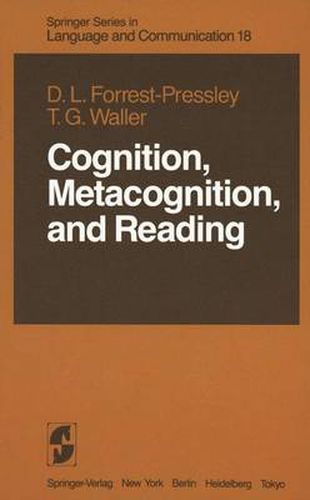Readings Newsletter
Become a Readings Member to make your shopping experience even easier.
Sign in or sign up for free!
You’re not far away from qualifying for FREE standard shipping within Australia
You’ve qualified for FREE standard shipping within Australia
The cart is loading…






This title is printed to order. This book may have been self-published. If so, we cannot guarantee the quality of the content. In the main most books will have gone through the editing process however some may not. We therefore suggest that you be aware of this before ordering this book. If in doubt check either the author or publisher’s details as we are unable to accept any returns unless they are faulty. Please contact us if you have any questions.
We had our first conversation about cognition, metacognition, and reading in September of 1976. Our particular concern was with reading and learning to read, and what, if anything, meta cognition might have to do with it all. We didn’t really know much about metacognition then, of course, but then most other people were in the same predicament. Some people had been working with interesting approaches and results on metalanguage and reading, among them J. Downing, L. Ehri, L. Gleitman, 1. Mattingly, and E. Ryan, and it also was about that time that people were becoming aware of E. Markman’s first studies of comprehension monitoring. Other than that perhaps the most influential item around was the perhaps already classic monograph by Kruetzer, Leonard, and Flavell on what children know about their own memory. Also in the air at that time were things like A. Brown’s notions about knowing, knowing about know ing, and knowing how to know, D. Meichenbaum’s ideas about cognitive behavior modification, and the work by A. Brown and S. Smiley on the awareness of important units in text. Even though these developments were cited as new and innovative, it was not the case that psychologists had never before been of questions. They certainly interested in, or concerned with metacognitive sorts had, as clearly evidenced by the notion of metaplans , in Miller, Galanter, and Pribram’s Plans and the Structure of Behavior.
$9.00 standard shipping within Australia
FREE standard shipping within Australia for orders over $100.00
Express & International shipping calculated at checkout
This title is printed to order. This book may have been self-published. If so, we cannot guarantee the quality of the content. In the main most books will have gone through the editing process however some may not. We therefore suggest that you be aware of this before ordering this book. If in doubt check either the author or publisher’s details as we are unable to accept any returns unless they are faulty. Please contact us if you have any questions.
We had our first conversation about cognition, metacognition, and reading in September of 1976. Our particular concern was with reading and learning to read, and what, if anything, meta cognition might have to do with it all. We didn’t really know much about metacognition then, of course, but then most other people were in the same predicament. Some people had been working with interesting approaches and results on metalanguage and reading, among them J. Downing, L. Ehri, L. Gleitman, 1. Mattingly, and E. Ryan, and it also was about that time that people were becoming aware of E. Markman’s first studies of comprehension monitoring. Other than that perhaps the most influential item around was the perhaps already classic monograph by Kruetzer, Leonard, and Flavell on what children know about their own memory. Also in the air at that time were things like A. Brown’s notions about knowing, knowing about know ing, and knowing how to know, D. Meichenbaum’s ideas about cognitive behavior modification, and the work by A. Brown and S. Smiley on the awareness of important units in text. Even though these developments were cited as new and innovative, it was not the case that psychologists had never before been of questions. They certainly interested in, or concerned with metacognitive sorts had, as clearly evidenced by the notion of metaplans , in Miller, Galanter, and Pribram’s Plans and the Structure of Behavior.